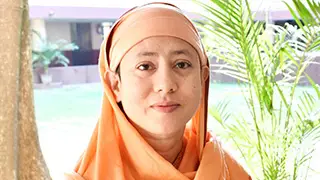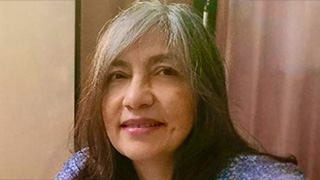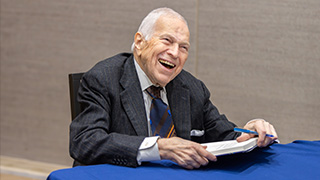Seton Hall To Host Bhagavad Gita Expert Mataji
Tuesday, March 21, 2023

Pravrajika Divyanandaprana, or Mataji, will speak about the Upanishads.
The Institute for Communication and Religion (ICR) is excited to announce “Bhagavad Gita – The Essence of Upanishads,” a talk featuring Mataji, a monastic member of Sri Sarada Math visiting from India. Pravrajika Divyanandaprana, or Mataji, is an internationally recognized expert on Ramakrishna-Vivekananda literature and Yoga-Vedanta texts focusing on the Brahma Sutras.
Those interested in this experience are welcome to attend Mataji's talk on Wednesday, April 5, 2023 at 9:30 a.m. in the Walsh Library Beck Rooms. The event will also be live-recorded and simulcast with the ICR's Indian distribution partner Shemaroo. Interested viewers may join the simulcast here. Register for this event »
ICR Director Jon Radwan, Ph.D., put the event into context, explaining that “Mataji's 2023 east coast lecture tour includes Seton Hall alongside MIT and Princeton University. The ICR is proud to bring top international scholars to Seton Hall.”
Mataji recently shared an advance preview of her talk. “The Upanishads are the knowledge portion of the Vedic thought and contain the essence of the Vedas. That is why the philosophy of the Upanishads is called Vedanta. The Bhagavad Gita is found in the Mahabharata, but the beauty of this literature is that it is a masterpiece of Vedantic thought. Thus, it can be said that the Bhagavad Gita is indeed the essence of the Upanishads. We shall observe a few verses in the Bhagavad Gita to understand this.” She summarized how “the Gita also harmonizes the four yogas — Bhakti Yoga, Jnana Yoga, Karma Yoga and Raja Yoga. It is a deep penetration into the existential core of the human personality structure, helping us understand the unfoldment of the highest consciousness, and making way for a most comprehensive and inclusive philosophy of human life.”
The Bhagavad Gita is one of the guiding scriptures of the Hindu religion, and features discourse on Self-Knowledge and the various paths one may take to achieve enlightenment. The Gita contains approximately 720 verses of dialogue between Lord Krishna and warrior prince Arjuna. As event co-organizer Jyoti Champanerkar, Ph.D. explained, “It is meant for anyone desiring to experience the truth of bringing fulfilment to their life. To make the most of the scripture, the seeker needs to feel the pinch of the problems of life and be willing to take them to God to solve them.” Champanerkar added, “Taking refuge in God does not free us from self-effort, it puts our human effort into divine context.”
This text is utilized in many Religious Studies courses globally, and Seton Hall University includes the Bhagavad Gita in its CORE Curriculum as a basis for engaging the Hindu faith. Participants in this event will be introduced to universal principles outlined in the text, with an emphasis on what these principles can offer to students. When asked about the importance of this study, Champanerkar stated, “It is a primary means to explore the human condition of existence and learn others' views on existence and purpose. It helps us develop respect for, and interest in diverse religions and thereby makes us more inclusive of traditions that are otherwise unfamiliar to us. When we see and experience that all religions are just different paths to that One reality, we become better practitioners of our own faith and more respectful of others.”
About the Institute for Communication and Religion
Launched in Fall 2017, the Institute for Communication and Religion within the College of Communication and the Arts provides a nexus for ongoing scholarly exploration of communication topics critically
important to religion and society. Guided by the spirit of ecumenical and interreligious
cooperation, the Institute seeks to engage in public dialogue and debate, promote
academic inquiry and support the religious dimension of creativity — all while upholding
the values of servant leadership, curricular innovation and intellectual excellence. Should
you have any questions, please do not hesitate to contact us.
Categories: Education, Faith and Service, Nation and World





